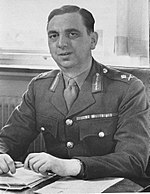Kenneth Strong, Date of Birth, Place of Birth, Date of Death
TweetKenneth Strong
British Army general
 Date of Birth: 09-Sep-1900
Date of Birth: 09-Sep-1900
 Place of Birth: Montrose, Scotland, United Kingdom
Place of Birth: Montrose, Scotland, United Kingdom
Date of Death: 11-Jan-1982
Profession: military personnel
Nationality: United Kingdom
Zodiac Sign: Virgo 
About Kenneth Strong
- Major-General Sir Kenneth William Dobson Strong (9 September 1900 – 11 January 1982) was a senior officer of the British Army who served in the Second World War, rising to become Director General of Intelligence.
- A graduate of the Royal Military Academy Sandhurst, Strong was commissioned into the 1st Battalion, Royal Scots Fusiliers in 1920.
- After service as an Intelligence Officer with his battalion in Ireland from 1920 to 1922 during the Irish War of Independence, he volunteered for service as an interpreter and was posted to Germany with the British Army of the Rhine.
- In 1935 he returned to Germany as a member of the International Force supervising the Saarland plebiscite.
- Afterwards, he joined the German Intelligence Section at the War Office.
- In 1937 he became Assistant Military attaché in Berlin. Strong became Head of the German Section at MI14 in August 1939, shortly before the outbreak of the Second World War.
- He commanded the 4th/5th Battalion, Royal Scots Fusiliers in 1941, before becoming Brigadier General Staff (BGS) for Intelligence at Home Forces in 1942.
- In March 1943, Strong was appointed Assistant Chief of Staff for Intelligence (G-2) at General Dwight D.
- Eisenhower's Allied Force Headquarters (AFHQ).
- He attended the Italian peace negotiations.
- In May 1944 he joined Eisenhower's Supreme Headquarters Allied Expeditionary Force (SHAEF), and played a leading part in the negotiations for the unconditional surrender of Germany in 1945. In August 1945, Strong became Deputy Director of the Political Warfare Executive, succeeding Sir Bruce Lockhart as its head a month later.
- He retired from the Army with the rank of major general in 1947 to become a civil servant.
- He was initially appointed Director General of the Political Intelligence Department of the Foreign Office.
- He was the first Director of the Joint Intelligence Bureau at the Ministry of Defence from 1948 until 1964, when he became the first Director General of Intelligence at the Ministry of Defence.
- He retired from the civil service in 1966.
Read more at Wikipedia

